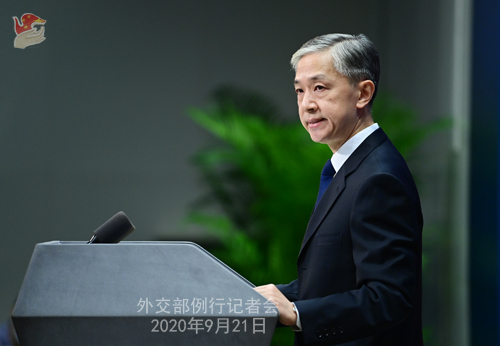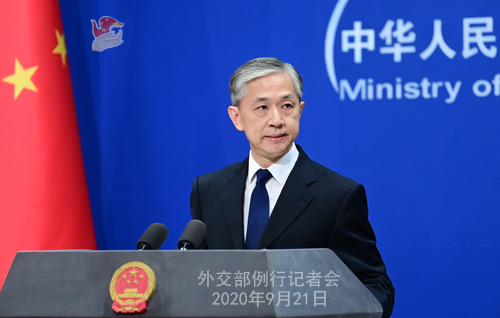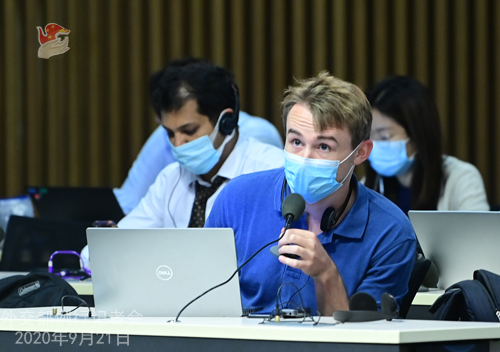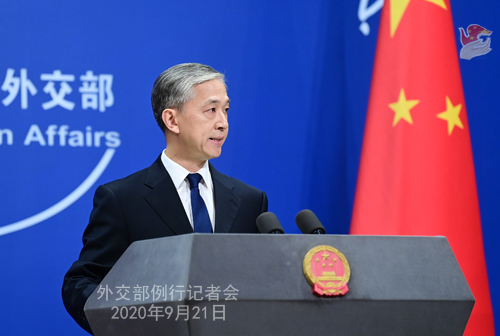| Foreign Ministry Spokesperson Wang Wenbin's Regular Press Conference on September 21, 2020 |
| 2020-09-21 23:20 |
|
CCTV: According to reports, during US Under Secretary of State Krach's visit to Taiwan from September 17 to 19, he met with the region's leadership including Tsai Ing-wen, and attended a memorial service of Lee Teng-hui. This is another visit to Taiwan by a senior US official following HHS Secretary Azar in August. What's China's comment on this? Wang Wenbin: China firmly opposes any kind of official ties between the US and the Taiwan region. By insistently sending HHS Secretary Azar and Under Secretary Krach to visit the region, the US has seriously violated the one-China principle and the three China-US joint communiqués. It is a political provocation that emboldens "Taiwan independence" separatists and undermines China-US relations as well as peace and stability across the Taiwan Strait. China firmly opposes and strongly condemns it. We will take countermeasures, including against relevant individuals. The US acts will have further negative consequences on China-US coordination and cooperation on major regional and international issues, for which it bears full responsibility. China is determined to safeguard sovereignty and territorial integrity, oppose external interference, and realize the reunification across the Taiwan Strait. We solemnly inform the US side that "Taiwan independence" only leads to a dead end, and efforts to condone and support "Taiwan independence" are doomed to fail. Any attempt to hurt China's core interests and interfere in China's internal affairs will be met with strong reactions. The historical trend of China's reunification won't be stopped by any force. China urges the US to correct its mistakes, fulfill its commitments in the three joint communiqués, stop its official exchange and military ties with Taiwan, and stop its interference in China's internal affairs as well as words and deeds that undermine China-US relations and peace and stability across the Taiwan Strait. Global Times: We noted that the foreign ministry website just released China's position paper for the UN Summit on Biodiversity entitled "Building a Shared Future for All Life on Earth: China in Action". Could you offer more information about it? Wang Wenbin: As the UN Summit on Biodiversity is to be held on September 30, the Ministry of Foreign Affairs and the Ministry of Ecology and Environment jointly released on September 21 China's position paper "Building a Shared Future for All Life on Earth: China in Action", elaborating on China's experience, progress, position and propositions on biodiversity conservation from the perspectives of philosophy of ecological civilization, domestic policy measures, promoting sustainable development, engagement of the entire society, global biodiversity governance, international exchanges and cooperation. As stated in the position paper, China will remain committed to pursuing ecological protection and green development. China stands for multilateralism and is committed to building a community with a shared future for mankind. China will actively participate in global biodiversity governance and contribute to global ecological civilization and to a shared future for all life on Earth. As the host of the 15th Conference of the Parties (COP15) to the Convention on Biological Diversity (CBD), China will make good preparations for it and stands ready to work together with other countries for an ambitious, balanced and realistic framework and a clean, beautiful world thriving with life. Reuters: The People's Liberation Army air force released a video showing its bombers carrying out a simulated attack on what appears to be Andersen Air Force Base on the U.S. Pacific island of Guam. Why did China use Guam in this video? Is the video intended as a threat to the US? Wang Wenbin: I'm not aware of what you said. Please consult the relevant authority.
CRI: The US unilaterally announced on September 19 that all UN Security Council sanctions against Iran had been restored, as the US invoked the "snapback" on August 20. What is your comment? Wang Wenbin: We have been reiterating China's position on how the Iranian nuclear issue may be approached at the Security Council. The US is no longer a party to the JCPOA. Its letter to the Security Council on August 20 has no legal validity, nor does the US have any right to demand that the Security Council invoke a snapback. The Security Council President concluded that he would take no further action on the US request and the Security Council has not taken any action on triggering the snapback. Therefore, the Security Council, pursuant to Resolution 2231, will continue with its ways with regards to the sanctions on Iran. Over the past weekend, parties to the JCPOA, including China, Russia, France, the UK and Germany, sent letters respectively to the Security Council President to make clear their opposition to the US unilateral announcement on restoring sanctions. The European Union also put out a statement. All these reflect the shared position and consensus of the international community. The US side is cherry-picking on international law-obeying or flouting it according to its own whim. It is not only breaking the law, but also threatening to use illegal unilateral sanctions to coerce other countries. This outrageous and unreasonable approach has been widely frowned upon and opposed by the international community. We hereby advise the US side not to go further down the road of unilateralism. China has noted the concerns of relevant countries over the situation in the Middle East and the Gulf. State Councilor and Foreign Minister Wang Yi has put forward the proposal that, under the premise of safeguarding JCPOA, efforts be made to seek out an additional platform for dialogue among regional countries to promote the formation of new consensus on safeguarding regional peace and stability. We are ready to work with relevant parties to continue to push for the political and diplomatic settlement of the Iranian nuclear issue. Bloomberg: Regarding the US government's recent move against Chinese tech companies, some observers say that Bytedance got its way retaining control of TikTok and its own algorithms, while avoiding a ban. Meanwhile, Tencent's WeChat users also managed to win a court injunction suspending the executive order. What's the foreign ministry's view of these developments? What does it tell us about China-US business ties? Wang Wenbin: We don't comment on the specific business behaviors of companies. As a principle, I'd like to reiterate that China urges the US to respect the principles of market economy and fair competition, observe international trade rules, stop politicizing normal trade and economic cooperation, and foster an open, fair, just and non-discriminatory business environment for foreign companies operating and investing in the US. China Daily: Many senior US officials have criticized the Chinese government on several occasions with regards to the issue of forced labor in Xinjiang. The US administration also rolled out sanction measures on Xinjiang companies. What is your comment? Wang Wenbin: Some people in the US deliberately choose to ignore the enormous efforts Xinjiang has taken to protect human rights but wantonly hype up the so-called "forced labor" issue in Xinjiang and slander Xinjiang's efforts to take good care of the workforce. Their groundless and untenable accusations exemplify disinformation and fake news. The State Council Information Office of the People's Republic of China just released a white paper titled "Employment and Labor Rights in Xinjiang". If those people in the US truly care about the employment situation in Xinjiang, I suggest they give a good read to this white paper. The white paper started by saying that "Work creates the means of existence and is an essential human activity". It creates a better life and enables all-round human development and the progress of civilization. The Constitution of the People's Republic of China provides that all citizens have the right and obligation to work. To protect the right to work is to safeguard human dignity and human rights. Workers' job preferences have always served as an important reference for the local government of Xinjiang in expanding employment channels and organizing vocational training sessions. In accordance with law, Xinjiang guarantees workers' equal right to employment, remuneration, rest and leisure, occupational safety, social insurance and freedom of religious belief. In accordance with the principle of equal protection of civil rights, Xinjiang ensures that there is no discrimination against workers on the basis of ethnicity, region, gender, or religious belief, and that no individuals' rights are restricted because of their urban or rural status, profession or position. The minimum salary in Xinjiang was raised by 19.74 percent from RMB1,520 per month in 2013 to RMB1,820 per month in 2018, which was at a high level in the country. Workers are guaranteed the right to time off on weekends and statutory holidays including the Spring Festival, Roza Festival (Eid al-Fitr) and Corban Festival (Eid al-Adha), and they can choose which languages to use for communication. Xinjiang has been firm in preventing and punishing any incidents of forced labor. The following actions are strictly forbidden and will lead to administrative punishments: forcing a person to work by means of violence, threat, or illegal limitation of personal freedom; or affronting, physically punishing, beating, illegally searching or detaining an employee. Should it be established that a crime has taken place, the perpetrator will be subjected to a criminal investigation. Xinjiang strictly observes 26 international labor conventions, including Discrimination (Employment and Occupation) Convention and the other three of the ILO's fundamental conventions and a host of UN conventions, including the International Covenant on Economic, Social and Cultural Rights, to effectively safeguard workers' rights and oppose forced labor. With the implementation of a series of employment policies and measures, Xinjiang has seen a notable improvement in living standards for all ethnic groups. The annual per capita income of workers from Xinjiang who are working in other provinces is about RMB40,000, and the local people who left their home to work elsewhere in Xinjiang have an annual per capita income of RMB30,000, much higher than earnings from farming. From 2013 to the end of 2019, the poverty incidence dropped from 19.4 percent to 1.24 percent. From 2014 to the end of 2019, a total of 2.92 million people shook off poverty. Respecting and protecting human rights are principles enshrined in the Constitution of China. The CPC and the Chinese government have always prioritized the protection of the citizens' rights to work and employment. We have taken a resolute stance against forced labor and eradicated it in any form. Xinjiang's policies and practices concerning employment and job security comply with China's Constitution and relevant laws and conform to international labor and human rights standards. For those who accuse Xinjiang of forced labor, they are either ignorant or have an ulterior motive to serve. We urge these people to respect basic facts, stop smearing Xinjiang's human rights record, stop interfering in China's internal affairs, and stop messing up with Xinjiang's stability and prosperity.
AFP: Could you give us any indication if China will approve the TikTok deal with Oracle and Walmart? Wang Wenbin: I answered a similar question earlier. I don't think I need to repeat it. South China Morning Post: First question, according to Indian media reports, the Indian police recently detained three persons suspected of providing intelligence to China, including one Chinese national. What's China's comment? Second, Indian media reports say China and India will soon hold another round of commander-level talks, can you confirm that and tell us the latest developments? Third, China announced last week that President Xi will attend via videolink the high-level meetings to commemorate the 75th anniversary of the UN. Can you give us more details on that? Wang Wenbin: On your first question, I'm not aware of that. On your second question, China and India have been in close communication with each other through diplomatic and military channels to resolve the current border situation. As I know, the sixth round of commander-level talks is taking place as we speak. The Chinese side will release relevant information in a timely manner if there's any. On your third question, President Xi Jinping will attend and address virtually a series of high-level meetings to mark the 75th anniversary of the UN, including the high-level meeting to commemorate the 75th anniversary of the UN, the General Debate of the 75th session of the UN General Assembly, the UN Summit on Biodiversity, and the UNGA High-level Meeting to Celebrate the 25th Anniversary of the Beijing Women's Conference. We've already released information on this. President Xi will elaborate China's proposals and propositions at these events on major issues of common concern to people of the whole world such as international relations, economic globalization, ecological conservation, global governance, and the global women's cause, and call for support for multilateralism, UN's authority and roles, the UN-centered international system, the international order based on international law, and a community with a shared future for mankind. Please stay tuned for more information. AFP: Do you have any response to the BBC report that a British man Fraser Cameron has been suspected of passing on sensitive information to Chinese spies? Wang Wenbin: I'm not aware of that. The ridiculous claim of "threats from Chinese spies" is nothing new; it is brought up every now and then but always proven to be false. China develops foreign relations based on principles including mutual respect and non-interference. We hope the relevant sides, including the media, can view and report related matters in an objective and rational manner.
Beijing Youth Daily: According to reports, China provided a batch of non-emergency humanitarian supplies to the Afghan government at a hand-over ceremony held in Kabul on September 20. I wonder if you could provide more details on Chinese assistance to Afghanistan? Wang Wenbin: After COVID-19 broke out, China feels deeply for the difficulties of the Afghan people. The Chinese government has provided the Afghan side with assistance including anti-epidemic supplies. The supplies handed over at the ceremony included tents, blankets and daily necessities. The Afghan side thanked the Chinese government and people for their continued donations and promised to distribute the supplies among those in need in all provinces as soon as possible. It is hoped that the supplies will improve the disaster emergency response capacity of the Afghan government, and provide safe shelter for those affected. As good neighbors, friends and partners, China and Afghanistan have always lived side by side with friendship and mutual assistance. Since the beginning of this year, the Chinese government and military have successively provided batches of anti-epidemic supplies to the Afghan side including masks, protective gowns, testing reagents, protective goggles, surgical gloves and thermometer guns to meet immediate needs. China will continue to contribute to Afghanistan's peaceful reconstruction and economic development and promote practical cooperation on BRI and in other areas to deliver more benefits to the two peoples. China News Service: Assistant Secretary for East Asian and Pacific Affairs David R. Stilwell and other US State Department officials said in their testimony before the Senate Committee on Foreign Relations that China is the number one foreign policy challenge of the US and the Department of State has asked all US posts around the world to be "sufficiently focused and coordinated" on the challenge posed by China. Do you have a response? Wang Wenbin: I noted reports on that. The remarks by certain US State Department officials disregard facts, distort facts and are loaded with ideological bias and Cold War mentality. Senior US officials lately have been busy cooking a mishmash of political lies on a series of issues relating to China. The remarks you mentioned serve as a case in point. The international community can see through this. I already stated China's solemn position on this at our press conference last week. Now I will stress again that China is committed to an independent foreign policy of peace, the path of peaceful development, a new type of international relations and a community with a shared future for mankind. China does not pose a threat to any country and it will never seek development at the expense of other countries. Attempts by the US to vilify and alienate China from other countries will not succeed. We urge certain US officials to respect facts, stop smearing China with ulterior motives and stop the anti-China rattle to avoid further damage to bilateral relations. Bloomberg: Taiwan newspaper reported that PLA pilots flew across the so-called median line on September 17. What's China's position on the "median line" issue? Wang Wenbin: The Taiwan region is an inalienable part of China's territory. The so-called "median line" is non-existent.
Shenzhen TV: Gar Pardy, who once served as the Canadian foreign ministry's director-general of consular affairs, helped organize a letter to Prime Minister Trudeau co-signed by over 100 former diplomats, calling for the swap of Meng Wanzhou for Michael Kovrig and Michael Spavor. He said the disputes between China and Canada not only affected bilateral relations, but also undermined Canada's capacity of handling international affairs. What's your comment? Wang Wenbin: We noticed the reports. Previously, 19 former Canadian politicians including former justice minister and former foreign minister wrote a joint letter to Prime Minister Trudeau asking for the release of Meng Wanzhou. China's position on the Meng Wanzhou case is clear and firm. Under the pretext of "at the request of the US", Canada arbitrarily took compulsory measures on a Chinese citizen, which severely violated her legitimate rights and interests. The nature of the Meng Wanzhou case is entirely different from that of the cases of the two Canadians. The Meng case is a serious political incident, while Michael Kovrig and Michael Spavor were suspected of conducting activities endangering China's national security. The Chinese judicial organs handle cases independently and the lawful rights of the two Canadians are guaranteed. I'd like to stress that it is precisely what Canada has done on the Meng case that caused the current difficulties in China-Canada relations. We urge Canada to earnestly respect China's solemn position and concerns, release Ms. Meng at once and ensure her safe return to China, so as to create conditions for the bilateral relationship to get back on the right track. AFP: US President Trump spoke on the phone with the new Japanese Prime Minister Suga, and they discussed how the two countries will pursue a free and open Indo-Pacific region. Do you have any comment on the call? Wang Wenbin: China has no objection to the development of normal relations between other countries. In the meantime, it is our position that such exchange and cooperation should be conducive to mutual trust between regional countries and peace, stability and prosperity of the region.
|
| |||||||||||||||||






